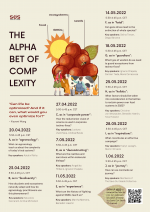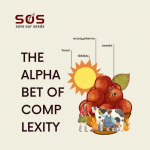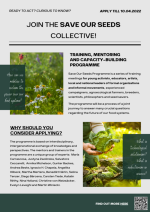GMO news related to Germany
19.01.2023 | permalink
VLOG survey: Distinct majority opposes lowering of EU GMO standards
The EU Commission is planning to lower the standards for the approval and labelling of genetically modified plants and food. The German government should not support this, according to a distinct majority in a new VLOG survey.
58 percent of respondents in a representative Civey survey at the beginning of January 2023 opposed the German support for the EU Commission's plans to deregulate genetic engineering, only 25 percent were in favour, and just under 17 percent were undecided.
17.01.2023 | permalink
Soup & Talk
DEMO 21.01.2023
Warming up after the Wir haben es satt!-Demo, eating soup, meeting people and hear and see what great approaches and projects for transformation already exist in agriculture - that's Soup&Talk!
In 5-minute turns, makers and shakers will present what they have already achieved or are currently starting, how we can participate, and what is next for farming, eating and sharing.
We will show how things can be done differently in food and farming. Over good soup for all, grassroots and agro-policy initiatives, sustainable companies of all kind and activists from all over the world will present their big and small contributions to social and ecological change. The last two years, we could only zoom. This time we'll mix contributions on site and online, German and English.
16.01.2023 | permalink
N as in "narrative" - join our webinar!
The Alphabet of Complexity Webinar Series!
N as in "narrative" - 8th of February 2023
This webinar will be our fourteenth meeting within the series of The Alphabet of Complexity webinars. The letter N (as in “narrative”) will guide us through the main question of the day: How can the narrative of restoration and reciprocity influence the course of agricultural policies? The lectures of three key speakers (Nara Petrovic, Anna Nacher, Marek Styczyński) will be followed by a discussion on how the perspective of restoration and reciprocity can inform our actions for the purity of seeds and against GMOs.
N as in Narrative:
How can the narrative of restoration and reciprocity influence the course of agricultural policies?
Key speakers: Nara Petrovic, Anna Nacher, Marek Styczyński
Time and date: 8.02.2023, 11a.m. - 1 p.m. CET
23.05.2022 | permalink
The series of 10 webinars: H, as in “holistic”
25.05.2022
5:30-6:45 p.m. CET
This webinar is the eighth episode of the series of ten The Alphabet of Complexity webinars. The letter H (as in “holistic”) will guide us through the main question of the day: What factors should be taken into consideration in the battles to reclaim power over food systems in 2022?
The key speakers of this webinar are Christine von Weizsäcker, Benedikt Haerlin and Nina Holland.
01.05.2022 | permalink

THE ALPHABET OF COMPLEXITY
Do you want to take part in the webinars only? Sign up to get the updates!
25.04.2022 | permalink
World Malaria Day 2022: What risks are we willing to take to (maybe) end malaria?
While this disease affects one third of the world’s population, some scientists suggest that a new technology called gene drive could be a game-changer.
Gene Drives – manipulating the DNA of mosquitoes to pass down an extinction gene
The research consortium Target Malaria, mostly funded by the Bill & Melinda Gates Foundation and the Open Philanthropy Fund, is developing genetically engineered mosquitoes in the lab that would either make all offspring male or all female offspring infertile. They use the Crispr-Cas methodology to implant a system into their DNA that would replicate when mosquitoes mate, ensuring that this gene spreads throughout the wild mosquito population. But while some hope that this would be the magic bullet to suppress mosquitoe populations and stop the malaria transmission cycle, this currently unproven high risk technology poses fundamental questions for humanity: How far are we willing to go, how high can the risks and uncertainties be in order to test a hypothesis?
The Risks of Gene Drive mosquitoes
22.04.2022 | permalink

Webinar: The Alphabet of Complexity: B, as in “biodiversity”
Sa. 23. Apr. 5:30pm - 6:45pm (CEST)
This webinar is our second meeting within the series of ten The Alphabet of Complexity webinars. The letter B (as in “biodiversity”) will guide us through the main question of the day: How do plants and ecosystems naturally adapt and how do agroecology practitioners use this phenomenon?
The key speakers of this webinar are Salvatore Ceccarelli, Annika Michelson.
14.04.2022 | permalink
EU Commission: political statements instead of scientific evidence
New letter reveals impact of trade interests and CETA
14 April 2022 / In a letter written in April 2022, the EU Commission states that CRISPR/Cas applications do not create any new or specific risks due to unintended effects. This letter came in response to a joint letter sent by the German Union of Peasant Farmers (AbL) and Testbiotech. In their letter, Testbiotech and the AbL argued that the statement made by the Commission is not based on scientific facts and is largely driven by trade interests, such as those included in the CETA free trade agreement (The Comprehensive Economic and Trade Agreement) between the EU and Canada.
07.04.2022 | permalink
Future of transgenic plants a thing of the past
No new applications for import into the EU in 2021
7 April 2022 / No new applications were registered in 2021 for the import of transgenic plants into the EU – the first time this has happened. The European Food Safety Authority EFSA was initially set up in 2004, and has since then received more than 150 applications for the market approval of transgenic plants. It appears that new applications were still being registered each year up until the end of 2020, although in noticeably fewer numbers. Possible reasons for the decrease: the cultivation of transgenic plants is stagnating in many growing regions; for decades there have been hardly any plants with really new traits, and, in addition, numerous risk-related issues remain unresolved.
02.04.2022 | permalink

Join a vibrant collective of activists!
Save Our Seeds Programme is a series of training meetings for young activists, educators, artists, local and national leaders of formal organizations and informal movements, experienced campaigners, agroecological farmers, breeders, scientists, philosophers and seed savers.
The programme will be divided into two parts – the public-open part, streamed online for a wider public and a closed part – an online workshop programme for our collective of activists.
The young activists interested in joining the collective will undergo an application process. All EU nationals between 16 and 30 years can apply by filling out THIS FORM till 10.04.2022.
